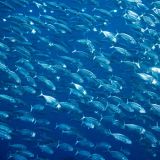Master\u2019s Degree in Fisheries Sciences and Management \u2013 Two Year Duration\nThis graduate level degree prepares students for senior positions in fields like environmental consulting, aquaculture, resource management, and university research. The master\u2019s curriculum combines coursework, directed/supervised research, and independent research. With the guidance of their supervisors, students conduct a thesis research project that investigates an issue or issues associated with oceans and fisheries. \n
Master\u2019s courses taken will vary based on each individual student\u2019s chosen area of research. However, at least some of the following classes are likely to be part of most programs:
\n
\n- Aquatic Sciences: Statistics / Bioinformatics and Applied Research
\n- Current Topics in Fisheries Management
\n- Genetics and Physiology \u2013 Current Topics
\n- Management Conservation and Restoration
\n- Ecology of Aquatic Ecosystems
\n- Sustainable Fisheries
\n- Climate Impacts on Fisheries
\n
\n
Among possible research concentrations are:
\n
\n- Marine Studies (Fisheries Resource Management) \u2013 fisheries ecology, resource management, economics, policy, and planning
\n- Marine Studies (Marine Spatial Planning and Management) \u2013 bioecological, socio-economic, cultural, technological elements of coastal zone development
\n- Maritime Management \u2013 international best practices for marine based operations
\n- Technology Management (Engineering and Applied Science Technology) \u2013 management of fisheries technical operations
\n- Fisheries Science (Stock Assessment) \u2013 focused on collecting, analyzing, and reporting demographic information on the abundance and abundance trends of fishery stocks
\n
\n
Doctoral Degree in Fisheries Sciences and Management \u2013 Four Year Duration
\nIndividuals who earn a Doctoral Degree in Fisheries Sciences and Management often become university faculty members or work in resource management positions with government agencies or private companies.
\n
Doctoral programs are very much research-focused. Students attend multiple seminars that address topics in ocean science, governance, and conservation; and prepare them to write their doctoral dissertation. Courses may include:
\n
\n- Aquatic Insects
\n- Limnology (study of inland fresh waters)
\n- Fish Physiology and Behavior
\n- Human Dimensions of Fish Conservation
\n- Analysis of Fisheries Populations
\n- Water Quality and Natural Resources
\n- Forest and Wetlands Conservation
\n- Wetlands Conservation
\n- Water Quality Field Methods
\n- Stream Restoration
\n
", "display_order": 2, "created_at": "2019-10-01T11:36:04.538023-07:00", "updated_at": "2021-12-01T13:07:29.915279-08:00"}, {"degree_id": 527, "page": 1, "title": "Degrees Similar to Fisheries Sciences and Management", "summary_markdown": "**Agroecology and Sustainable Agriculture** \r\nDegree programs in this field teach students how to practise environmentally sustainable farming. Courses include soil science, animal science, plant science, and organic farming. \r\n\r\n**[Conservation Biology](/degrees/conservation-biology-degree/)** \r\nConservation biologists apply biological principles to the preservation and rehabilitation of wildlife. They may be involved in enforcing hunting laws and in conservation education. \r\n\r\n**[Ecology](/degrees/ecology-degree/)** \r\nStudents who pursue a degree in ecology study how organisms interact with the natural environments that they live in and how these environments can be protected. In other words, the focus of ecology is to understand ecosystems as well as the social and political interests and policies that threaten them. An ecology curriculum, therefore, starts with courses in both the natural sciences \u2013 like biology, chemistry, physics, and geology \u2013 and the social sciences. \r\n\r\n**[Environmental Engineering](/degrees/environmental-engineering-degree/)** \r\nThis branch of engineering is concerned with finding solutions to environmental problems. Degree programs in the field prepare students to work as environmental engineers, who develop plans to prevent and control air and water pollution, improve recycling and waste disposal, and advance public health.", "content_markdown": "**[Environmental Science](/degrees/environmental-science-degree/)** \r\nThe basis of this discipline is that all natural things interact. Individuals who pursue a degree in the field learn how to analyze aspects of the environment and identify the causes of environmental problems. \r\n\r\n**[Marine Biology](/degrees/marine-biology-degree/)** \r\nStudents who earn a degree in marine biology study marine organisms and their behaviors and interactions with the environment. \r\n\r\n**[Natural Resource Conservation](/degrees/natural-resource-conservation-degree/)** \r\nDegree programs in natural resource conservation teach students how to protect natural areas like forests, parks, and rangelands. Classes typically cover plant and animal identification and natural resources policy and administration.", "content_html": "
Environmental Science
\nThe basis of this discipline is that all natural things interact. Individuals who pursue a degree in the field learn how to analyze aspects of the environment and identify the causes of environmental problems.
\n
Marine Biology
\nStudents who earn a degree in marine biology study marine organisms and their behaviors and interactions with the environment.
\n
Natural Resource Conservation
\nDegree programs in natural resource conservation teach students how to protect natural areas like forests, parks, and rangelands. Classes typically cover plant and animal identification and natural resources policy and administration.
", "display_order": 3, "created_at": "2019-10-01T11:36:04.539076-07:00", "updated_at": "2021-12-01T13:08:38.705144-08:00"}, {"degree_id": 527, "page": 1, "title": "Skills You’ll Learn", "summary_markdown": "- Research / analytical / data interpretation skills \r\n- Capacity to conduct fieldwork \r\n- Attention to detail / Accuracy \r\n- Patience \r\n- Problem-solving skills \r\n- Oral and written communication skills \r\n- Computer literacy \r\n- Project management \r\n- Report writing", "content_markdown": "", "content_html": "", "display_order": 4, "created_at": "2019-10-01T11:36:04.540107-07:00", "updated_at": "2021-11-29T11:28:40.597945-08:00"}, {"degree_id": 527, "page": 1, "title": "What Can You Do with a Fisheries Sciences and Management Degree?", "summary_markdown": "**Federal, State, and Municipal Government Departments and Agencies** \r\n**Public and Private Aquaculture Organizations and Laboratories** \r\n**Environmental and Ecological Consulting Firms** \r\n**Fish Hatcheries** \r\n**Commercial Fisheries** \r\n**Universities and Colleges** \r\n\r\nIn the above sectors, individuals with a degree in fisheries sciences and management may find employment that involves: \r\n\r\n- Researching fish health, genetics, and populations \r\n- Assessing the impacts of polluted areas on fish populations and habitats \r\n- Developing and implementing programs to monitor and improve fish habitats \r\n- Developing sustainable fish harvesting programs \r\n- Writing reports and documents for both the industry and the public \r\n- Developing fishing and fisheries sciences and management education programs \r\n- Teaching", "content_markdown": "", "content_html": "", "display_order": 5, "created_at": "2019-10-01T11:36:04.541134-07:00", "updated_at": "2021-11-29T11:28:40.631557-08:00"}], "degree_specializations": []}">

